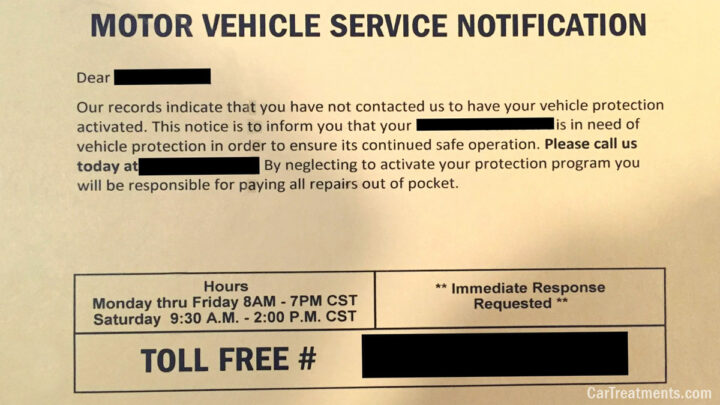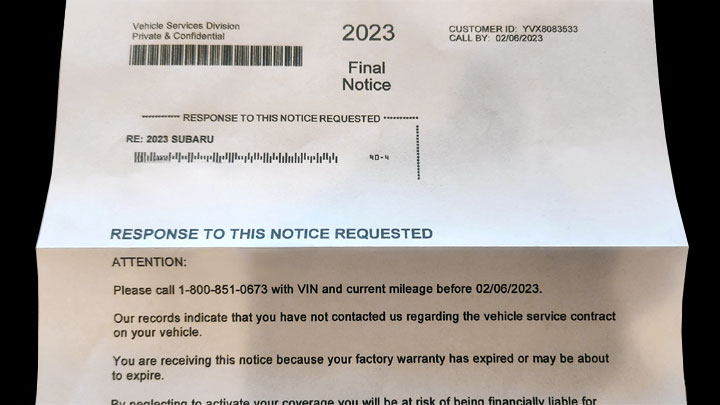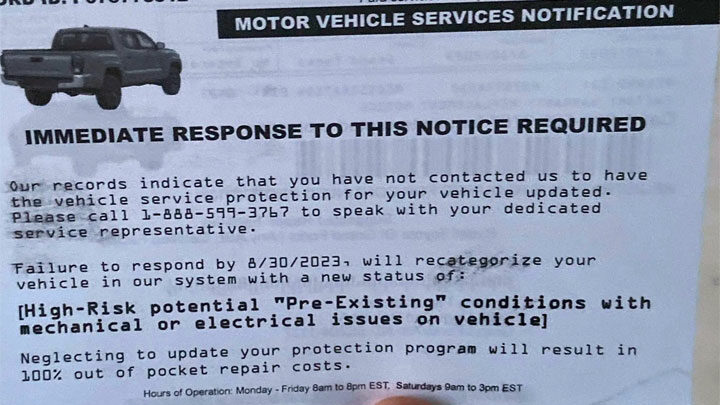Received a Motor Vehicle Service Notification? (Don’t Get Scammed!)
Have you recently received an official-looking letter or postcard, claiming that your vehicle’s warranty coverage is about to expire?
Is it legit? Is it a scam? Do you need to respond to it?
Keep reading to learn what we’ve discovered about the legitimacy of motor vehicle service notifications and what you should do if you receive one.

See Also: How to Avoid Being Ripped Off By a Dishonest Mechanic
What Exactly Is a Motor Vehicle Services Notice?
A motor vehicle service notice is any article, legitimate or not, received by a motor vehicle owner that details the need to take action against an expiring vehicle warranty.
These notices generally come by mail, and are printed upon postcards or a pink slip of card-like parchment. However, in recent years, such notices have been delivered in the form of a letter with increasing frequency.
The verbiage included in motor vehicle service notices often varies. However, the recurring theme of these letters tends to center around an urgent need to extend vehicle warranty coverage, in a bid to prevent incurring costly repair charges in the future.
You can expect it to sound much like a sales ad, employing a “call to action”, at its conclusion.
Most often, you’ll see a message with phrasing similar to “Act now to extend your vehicle’s warranty, and avoid costly repairs” or “Call now to make sure that vehicle repairs and maintenance don’t cost you an arm or a leg”.
No matter the exact wording, the intent is the same. Every motor vehicle service notice attempts to get the targeted motorist to invest in an extended warranty, supposedly saving them from exorbitant repair costs.
How Long Have These Been Around?
Early motor vehicle service notices date back as early as the 1990s, possibly earlier in some cases. That being said, the issuance of these notices has skyrocketed in frequency over the past couple of decades.
Dealers and “bad actors” alike work harder each day to profit off of such notices, and the confusion that they often cause.
Some cite the increasing age of the average automotive consumer as the reason behind the increased prominence of motor vehicle service notice-related mail.
On average, the vast majority of motorists receive a significant amount of mail on a regular basis, some of which is legitimate, and some is not. The point at which this line becomes blurred is where these notices equate to profits for their distributors.
Read Also: Watch Out for These 4 Common Oil Change Scams
Evaluation of the Legitimacy of Services Notifications

If you are in doubt as to the legitimacy of a service notification that you have received, you should consult the specific dealership from which it has supposedly originated.
Do not call the phone number included in the notification that you have received. Instead, call a known legitimate number for the dealership in question, and ask to speak to the dealership’s service manager for further clarity.
Any service notification sent from a third-party entity, not related to your vehicle’s manufacturer is best disregarded. Notices of this type are almost always a scam and should be ignored.
In NO CASE should the phone number on such notifications be called. If you make a call on an illegitimate service notice, it will just make you more prone to being targeted by scams of this nature in the future. In other words, you’ll be put on another “list”.
How to Recognize a Legit Notification
The following tips can be followed to help you recognize a legit service notification, in case one is received.
Look For Contact Info
If a service notification contains accurate contact information for the dealership from which it supposedly originated, there is a decent chance that it is of a legitimate nature.
Both the address and phone number for this dealership should mirror those pinpointed through a quick Google search.
Standard Sales-like Verbiage
Most legitimate service notifications will feature relatively standard verbiage in their address to consumers. The context of the notice should be friendly, yet sales-like in nature.
On the other hand, service notices that seem threatening in nature or use scare tactics are almost always a scam.
Notice Sent at Correct Time
Carefully study the terms of your car’s original warranty. If the service notice in question has arrived at the exact time in which your vehicle’s standard warranty is set to expire, it is probable that this notice is legitimate.
On the other hand, if you receive the notice shortly after your vehicle has been purchased, or long after its stock warranty has expired, expect it to be fake.
Basic Info Is Complete and Accurate
Any service notice that is received should contain an accurate description of your vehicle, its mileage, and your basic consumer profile. If this isn’t the case, and the notification itself feels much like a blanket address, it is likely illegitimate.
See Also: 20 Things EVERY Car Owner Should Know (According to Experts)
How to Recognize a Scam

There are a few things you can look for to help identify a scam motor vehicle service notification.
Lack of Dealership Credentials
If a motor vehicle service notice does not contain any pertinent dealership or manufacturer related information, it should be discarded immediately. In almost every case, this is the sure sign of a scam communication and a poorly presented one at that.
Vague Consumer Info/Retails
If you receive service notification that is extremely vague or does not address you by name, it is likely spam. These suspicions are further founded if no mention of your vehicle’s make and model or mileage is included. Notifications of this type are best discarded.
Threatening Verbiage
If a motor vehicle service notice ever seems threatening, painting you as a villain for doodling yourself to expensive repairs in the future, it is almost always a fraud. Automakers are in the business of retaining consumers, not chastising them for the sake of an extended warranty.
Illogical Timing
It goes without saying that you should not be receiving a service notice for a vehicle that’s only two months old. Likewise, one should not receive this type of notification for a vehicle that is 10+ years old.
Use common sense. If it feels as if the timing of a service notification delivery is suspect, it probably is.
What Should You Do If You Receive One of These Notices?

The first item of business that should be tended to when receiving a motor vehicle service notification involves discerning whether or not the notice in question is of a legitimate nature. If it’s been blatantly sent from a third-party entity, you should disregard the notice in question, without exception.
If the notice that has been received appears to be from a local dealership, follow up research is suggested. Try calling a known dealership contact number, such as that provided by the average Google search, to reach a dealership representative who can vouch for the notice’s legitimacy.
Never call the number provided on the service notice itself, unless, of course, this number matches that of the actual dealer itself.
Are There Consequences For Not Responding?
Though many motor vehicle service notices sound convincing, or even threatening, in nature, there are virtually no negative consequences that can come from simply ignoring it.
Notifications of this nature, especially those sent by an illegitimate third-party, attempt to scare consumers into purchasing an extended warranty of one type or another. These are the first pieces of mail that should be discarded in the trash.
Like scam emails, these types of notices continue to get sent because enough people fall for them to make it worth the scammer’s time and money. Don’t help their cause.
Even if a motor vehicle service notification has been sent from a valid source, such as an automotive dealership, there is little in the way of consequences that can arise from ignoring it.
At worst, you might fail to purchase an extended warranty of one type or another. If in doubt, the same sort of warranty should be able to be purchased with a quick visit to the dealership in question.
How Do Car Warranty Companies Get My Info?
Third-party car warranty companies accumulate consumer info through basic internet research. One downside of the technological age that we live in, is that it’s often possible find an individual’s phone number, mailing address, and name, through a basic Google search.
While it might be hard to believe, the average third-party warranty company representative can compile hundreds of addresses in a single work shift.
This problem is further magnified if you consider that these warranty companies have as many as 50-100 employees (many in other countries) working around the clock to assemble endless lists of consumer information.
At the same time, no less than 100 companies worldwide are operating under the same exact business model. With this in mind, it is no wonder vehicle owners have been known to receive 2-3 motor vehicle service notifications in a week.
- 5 Symptoms of an EVAP Leak (and Repair Cost) - Apr 27, 2024
- P0480 Code (Symptoms, Causes, and How to Fix) - Apr 19, 2024
- Car Temperature Gauge Stopped Working? (Here’s Why) - Apr 15, 2024
